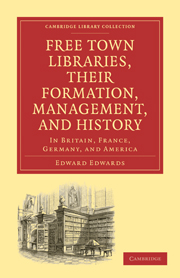 Free Town Libraries, their Formation, Management, and History
Free Town Libraries, their Formation, Management, and History Book contents
- Frontmatter
- PREFACE
- CORRECTIONS
- Contents
- BOOK THE FIRST: FREE TOWN LIBRARIES, AT HOME
- BOOK THE SECOND: FREE TOWN LIBRARIES, ABROAD
- BOOK THE THIRD: FREE TOWN LIBRARIES, IN AMERICA
- CHAPTER I INTRODUCTORY
- CHAPTER II HISTORY OF THE FREE CITY LIBRARY OF BOSTON
- CHAPTER III MINOR TOWN AND DISTRICT LIBRARIES OF MASSACHUSETTS
- CHAPTER IV HISTORY OF THE ASTOR FREE LIBRARY OF THE CITY OF NEW YORK; WITH SOME NOTICE OF ITS FOUNDER
- CHAPTER V DISTRICT, TOWNSHIP, AND OTHER FREELY-ACCESSIBLE LIBRARIES IN THE UNITED STATES
- CHAPTER VI THE FREE LIBRARIES OF BRITISH AMERICA
- BOOK THE FOURTH: BRIEF NOTICES OF COLLECTORS
- GENERAL INDEX
CHAPTER IV - HISTORY OF THE ASTOR FREE LIBRARY OF THE CITY OF NEW YORK; WITH SOME NOTICE OF ITS FOUNDER
Published online by Cambridge University Press: 05 October 2010
- Frontmatter
- PREFACE
- CORRECTIONS
- Contents
- BOOK THE FIRST: FREE TOWN LIBRARIES, AT HOME
- BOOK THE SECOND: FREE TOWN LIBRARIES, ABROAD
- BOOK THE THIRD: FREE TOWN LIBRARIES, IN AMERICA
- CHAPTER I INTRODUCTORY
- CHAPTER II HISTORY OF THE FREE CITY LIBRARY OF BOSTON
- CHAPTER III MINOR TOWN AND DISTRICT LIBRARIES OF MASSACHUSETTS
- CHAPTER IV HISTORY OF THE ASTOR FREE LIBRARY OF THE CITY OF NEW YORK; WITH SOME NOTICE OF ITS FOUNDER
- CHAPTER V DISTRICT, TOWNSHIP, AND OTHER FREELY-ACCESSIBLE LIBRARIES IN THE UNITED STATES
- CHAPTER VI THE FREE LIBRARIES OF BRITISH AMERICA
- BOOK THE FOURTH: BRIEF NOTICES OF COLLECTORS
- GENERAL INDEX
Summary
The Founder of the Astor Library
John Jacob Astor was a native of the village of Waldorf, in the Duchy of Baden, where he was born on the 17th of July, 1763. He left his birthplace to seek his fortune in a wider sphere of labour, before he was nineteen years old. After a brief stay in London, he set out for America in the autumn of 1783, but the March of 1784 had arrived, before the vessel in which he sailed landed him at Baltimore. An incident that grew out of the unexpected detention on shipboard gave, as it seems, an impulse and direction to his whole subsequent life.
When he left England, it appears to have been Astor's purpose to establish himself as a dealer in musical instruments. An elder brother, who had settled in London some years earlier, was already in that trade, and by him Jacob Astor was supplied with a consignment of goods for the American market. When his ship got into Chesapeake Bay the ice-masses of an unusually fierce winter kept it there, weatherbound, for almost three months. To a youthful passenger of sanguine temperament, just entering on active life, and resolutely bent on so wooing Fortune as to win her, it must needs have been a weary time. He wiled away some of the long days of detention by interminable conversations with a German fellow-traveller.
- Type
- Chapter
- Information
- Free Town Libraries, their Formation, Management, and HistoryIn Britain, France, Germany, and America, pp. 309 - 324Publisher: Cambridge University PressPrint publication year: 2010First published in: 1869


